- Home
- Mack Reynolds
Rolltown bh-3
Rolltown bh-3 Read online
Rolltown
( Bat Hardin - 3 )
Mack Reynolds
A shorter version of this novel was published in If magazine in Jul and Sep 1969 issues under the title “The Towns Must Roll”.
Rolltown
by Mack Reynolds
I
Bat Hardin was getting fully immersed in his book when Ferd Zogbaum’s knock came on the door. He gave a grunt of displeasure, marked his page and got up.
Ferd’s camper was on the slow and awkward side, comparatively, so Bat suggested that they take his electro-steamer. Linares proper was about a kilometer down the road and it took them only minutes to arrive.
On the way, Bat said, “What do you expect to find?”
“Darned if I know,” Ferd said grumpily. “It wasn’t my idea to go into town. It was yours.”
Bat said, “I thought we’d just scout around a little. Do you speak Spanish?”
“No. A little German.”
“That’ll do us a hell of a lot of good,” Bat said. “A great couple of snoopers we’ll be. About all I can say in Spanish is una mas cerveza, por favor.”
“What does that mean?”
“Another beer, please.”
“Great,” Ferd grinned sourly. “We’d better make a beeline for a bar, then.”
The town of Linares boasted a population of approximately 14,000 and had little call to fame. The area was not particularly suited to farming, mining nor, certainly, industry, and since its scenic attractions were only fair, tourism was also a matter of little gain. Thus it was that the community had hardly participated in the growth of Mexico proper such as the progressive cities of Monterrey, Guadalajara, Vera Cruz and above all Mexico City itself. In fact, Linares remained a town of yesteryear, a sleepy, dull and, at this time of the year, at least, dusty backwash to the days of Pancho Villa.
The main highway leading west and, further on, south, compounded insult to injury by avoiding Linares proper. Bat and Ferd had to take a side street to the village zocco or plaza, the center about which every Mexican hamlet, village or city revolves.
It differed not at all, except possibly being amongst the least picturesque in all the Republic, from the norm. There was a park, a bandstand in its center, iron benches about the perimeter, patches of sad flowers spotted here and there. A score of trees provided perching for multitudes of birds which evidently had no respect for weary townsmen slumped below on the benches.
There were few cars parked about the square, and those that were there were more often old-fashioned internal combustion engines, rather than steamers or the more recent electro-steamers. Evidently, pollution laws had never been enforced in Mexico. In fact, of wheeled vehicles there were more beaten up trucks and buses than private cars.
“A cantina it is,” Bat muttered. “I wonder if anybody else from New Woodstock has come in.”
“I doubt it,” Ferd said. “Everybody’s tired. Maybe tomorrow, somebody’ll get up the gumption. Most of the community’s never been in Mexico before. There’s one over there. Dig that. I don’t believe I’ve ever seen swinging doors on a bar outside a historic TV show before.”
Bat Hardin parked the electro-steamer in front of the bar in question and got out, Ferd doing the same on the other side.
Three or four indolent villagers, leaning up against adobe wall or lamppost, seemed to take displeasure when Bat locked the car doors. He wondered idly if it was because they were thwarted in going through the vehicle, or if they were objecting to his suggesting that it might be done if he failed to lock up. Come to think of it, Bat recalled that in these small towns, at least, the crime rate was said to be infinitesimal, though it could be different in the larger, more sophisticated cities. What crime there was usually consisted of violence between family members or between different families, usually involving passion or feud, rather than pilferage or robbery committed against foreigners. However, he still locked the car.
Ferd led the way through the swinging doors. If the town as a whole had reminded them of a movie set based on the Mexican revolution of 1910, there was little in the interior that would indicate the bar wasn’t a continuation of the set. The room was long, the walls decorated with bullfight posters and illustrations of bountifully bosomed Playmates, probably long deceased, along with the magazine which had once built its reputation with them. There was a brass rail along the bottom of the bar and a tile trough with running water for those who must needs expectorate. At the far end of the bar, along the whole wall which faced the door was a tile urinal which could easily have accommodated half a dozen beer-drinking customers at a time. There was a stench of stale urine in the air, along with that of unwashed bodies. Obviously this was a resort that did not cater to women, not to speak of catering to ladies.
There were perhaps twenty imbibers present, leaning on a prehistoric bar that would have accommodated double the number. Behind it were three bartenders; one, a fifty-year-old pushing three hundred pounds in weight, was obviously the proprietor, the others, two youngsters in their teens. The liquor selection was limited; tequila, mescal, rum and gin. A battered refrigerator indicated that at least the beer and coke would be cold.
Ferd muttered from the side of his mouth, even as they found a place, “Montezuma drank here.”
“Or at least, Cortes,” Bat muttered back. “I’ve recently become an authority on the subject. According to the books, the Aztecs didn’t drink anything but pulque.”
A silence had fallen upon their entry. The two Americans ignored it.
The proprietor, who puffed slightly upon movement, hesitated for a long moment but finally came down to them, ignoring some of the cold stares of his regular customers.
He stood before them, both obscenely fat hands on the bar and said, expressionlessly, “Senors?”
Bat said to Ferd, “First day in Mexico. Nothing would do except tequila.”
“Right as rain.”
“Tequila, por favor,” Bat said to the bartender.
The other nodded, turned and secured a bottle of the white liquid nuclear bomb, a saucer of limes cut into quarters and a shaker of salt.
He muttered, barely audibly, “Salud,” and turned away.
“Jesus,” Ferd said. “The hospitality around here is boundless.”
Both Bat and Ferd had been in the country before and knew the routine. They poured themselves drinks that would have been called triples in the States into the shot glasses, took up the salt in turn and sprinkled a touch of it on the back of their left hands. They touched their tongues to the salt, tossed the tequila back in one fell swoop, then grabbed up a quarter of the lime and bit into it.
“Wow!” Ferd said, half in appreciation, half in objection to the strength of the fiery product of the maguey plant.
The Mexican, standing nearest to them at Bat’s left, sneered and said in passable English, “Ah, not enough macho for tequila, eh, gringo?”
Ferd hesitated for a moment. Finally, he said to Bat, “Well, we came here to learn. What does macho mean?”
Bat said quietly, “Manliness, more or less. The quality of being a real man.” He was nibbling unhappily at his lower lip.
“And gringo?”
“It’s a derogatory word for an American. Why it should be derogatory, I wouldn’t know. Evidently, it comes down from the Mexican War days. When the American troops invaded from Texas and Vera Cruz one of the popular songs of the day was Robert Burns’ “Green Grow the Rushes, Oh” and the Americans sang it as a marching tune. The Mexicans of the time took the first two words and called the unwelcome invaders ‘green grows’, or ‘gringos’. It bears a sneering connotation.”
“Thanks for the lecture,” Ferd said politely. He turned to the Mexican. “And you’re a greaser.”
<
br /> “Holy Smokes…” Bat began in protest, and much too late.
The Mexican, although a small man by the standards of either of the two foreigners, with a sweep of his right arm pushed Bat Harden to the side that he all but fell onto the wall behind them.
The Mexican moved in fast, so fast that he should have been upon Ferd before that worthy could erect defenses.
However, the American was prepared. Ferd went backward in the one, two, three shuffle of the trained pugilist, his hands coming up in fists.
The Mexican was ardent but fighting out of his class as well as weight, height and reach. He swung once, twice, wildly. And then Ferd Zogbaum stepped in with a classic feint of the left and then a crushing blow into the other’s stomach with his right.
Bat Hardin, meanwhile, had found his feet again and turned to meet the rush of the other occupants of the bar. Unlike his companion, he adopted a crouching stance, his hands slightly forward and held as choppers, rather than fists. He had not spent his long years in the Asian War without compiling background in hand-to-hand combat.
The very number of the others, in the confined space of the cantina, was their handicap. That and the fact that the locals had been doing a considerable amount of drinking before the arrival of the strangers. They had the spirit of the thing completely, but precious little science. While his companion was finishing off his attacker, Bat was able to hold them although he was being pushed back by sheer weight.
Ferd yelled, “Let’s get out of here, Bat!”
But Bat was nearly eliminated from the fray at this point by an attack on his flank. The bartender, with something that looked like a child’s baseball bat in one of his fat paws, leaned over the bar and with surprising speed took a massive swing at the embattled American. Bat caught the motion from the side of his eye and tried to swing away from the blow but only partially succeeded and for a moment the fog seemed to roll in when the bludgeon struck him glancingly on the side of his head.
Ferd caught him, supported him just long enough for the other to shake his head in an attempt to clear it.
Swinging almost as wildly as the charging locals now, the two shuffled backward toward the swinging doors.
“I’ll try to hold them,” Ferd yelled. “Get the car door open!”
It was the obvious strategy. Bat turned quickly and made a dash for it. In the street, he straight-armed one of the loungers who had been outside and who was now coming up on the run, obviously attracted by the sounds of the battle. Another was coming from the opposite direction, a smallish youngster probably not out of his teens. However, Bat Hardin had neither time nor patience for compassion. He slugged the younger man in the face, putting him down, and tore his car keys from his pocket. He fumbled at the door’s lock, and felt arms grasping him from the rear. He reached back, snagged an arm and threw the other brutally over his shoulder in the old wrestler’s favorite hold, the Flying Mare.
Ferd Zogbaum erupted from the cantina and slammed the doors back into the faces of the enraged enemy.
The car door was open. Bat Hardin darted in and snaked across the seat to the driver’s position. Ferd was still holding the rapidly emerging local citizens, his arms swinging like windmills. Bat reached out and grabbed him by the belt and pulled him bodily inside in a sprawl.
The car began to move forward. Bat deliberately held down his speed so as not to seriously harm the two or three of the enemy who were immediately ahead, trying to stop him. They scurried to either side as he slowly speeded up. A few were already heaving rocks, which bounded off the car’s side.
Ferd had finally managed to sit erect and now slammed shut the still open door on his side. “Fun and games!” he yelped. “Get us the hell out of here, Bat. If any of those jokers are heeled, we’ve had it.”
Bat growled, “This is a converted police riot car. They’d have to have anti-tank guns.”
They were back on the main road leading out of town and to the site where New Woodstock was parked.
“Armored, eh?” Ferd said and then, “Hey, you’ve got a nasty cut on your head.” He pulled forth a handkerchief and handed it over. “This is clean.” Then he put a hand to his own head and groaned.
Bat Hardin, driving with one hand, held the handkerchief to the cut. “What the hell’s the matter?” he said. “If there’d been any gunfire, I’d say you’d copped one.”
“Splitting headache,” Ferd muttered. “I always get them, if I get into a fight.”
“By Christ,” Bat said bitterly. “I always thought of you as an easygoing character. What the hell was the idea of calling that guy a greaser? Haven’t you ever heard that a gentle answer turneth away rats?”
“Yeah, and you can lead a horse to water but you can’t make her,” Ferd groaned, still holding his head. “Listen, we had no more chance of getting out of that joint without a scrap than we have of flying without wings. Couldn’t you feel that in the air when we walked in? That bartender would have slipped us a mickey, if he’d had one handy. I just precipitated it before they got organized#longdash#thank God.”
“More of your feminine intuition?” Bat said in disgust. He dabbed at his head and looked at the handkerchief. He was bleeding profusely. “I’ll have to take this to Doc,” he growled.
They were approaching the camp site.
Ferd looked over his shoulder. “None of them coming#longdash#yet.”
“They won’t come,” Bat said, still in disgust. “There weren’t more than twenty or so of them, most of them tight. If we stuck around here for any length of time at all, they might stir up enough of the other townspeople to help them give us a hard time, but as of right now they’d be outnumbered. I suspect that the local cops, at this moment, are cooling them.”
He pulled up before the mobile town’s clinic.
Doc Barnes was sitting in a folding chair out front talking to his nurse who was also relaxed in the cool of the evening.
Ferd muttered, “This head is killing me. I’ll go over to my own place. See you later, Bat.” He stumbled from the vehicle, head still in hands, and staggered away.
II
New Woodstock had crossed the Rio Grande at McAllen and passed through the Mexican city of Reynosa.
There had been two fairly major sites on the American side of the border with excellent facilities for as many as ten thousand homes apiece but Bat Hardin and the executive committee had checked to find that the next nearest site was at Linares, a full 254 kilometers to the southwest. They wanted to push on through and avoid the necessity of setting up for the night at some second class or emergency site where there would be inadequate supply facilities and other shortcomings. There would be enough of that when they got down into Central America and beyond.
The committee had handled all the required border formalities the day before so that there was nothing to hold them up. Bat Hardin leading, as usual, they strung out along the highway, some füve hundred homes strong, with the auxiliary vehicles spaced periodically between them. Most of the homes were drawn by fairly modern electro-steamers but when you were dealing with even five hundred mobile homes you could hardly expect very often to get through one whole day without some needed minor repairs.
The stretch from Reynosa to the little town of China, where they branched off onto a side road so as to avoid the large city, of Monterrey, was excellent enough. Above ground, of course, and not automated as would have been an American road of this size, but adequate. Even the Pan American Highway was far from completely automated and this was not the Pan American Highway as yet. They’d join that further south.
Bat rode alone in his converted police vehicle, drawing his moderately-sized mobile home behind. He was far from a misogynist but at this junction in his life he had no permanent feminine affiliations and, for some reason not quite clear to even himself, he desired none. He was a fairly tall man with a military carriage and a habitually worried expression. His hair was crisp, his complexion dark and his features so heavy that he would hardly
have been thought of as handsome by average American standards. He had a nervous habit of gnawing on his underlip at the slightest of problems.
He wore a khaki semi-uniform. Local police often had a chip on their shoulders in their attitude toward the pseudo-police of the mobile towns, who, after all, had no authority in the areas through which they passed. Law in the mobile towns was largely a voluntary matter#longdash#minor infractions could be taken care of in the community but on any major matter it was necessary to call in the proper authorities of whatever area the town was in at the time. Yes, it was all very voluntary; however, there was a certain moral obligation to abide by the decisions of the easygoing town officials and that member of the community who persisted in revolt against community rules was soon invited to take himself off. It was the ultimate punishment that could be inflicted and for all practical purposes the only one save ostracism.
This part of Mexico was not particularly attractive as areas Bat had known from earlier trips but the site at which they were to stay that evening was at the edge of the mountains and on the banks of a stream. And the following day they should be getting into the Mexico famed in story and song.
At the thought of that Bat Hardin grunted deprecation. The world was becoming one in more than one sense. The larger cities, in particular, such as still existed at least, were becoming unbelievably alike. Somehow or other, they all seemed to look like Cincinnati. He was hoping that it would be different in South America. It was said that many areas of South America still resisted what was sometimes called the Coca-Colaization of the world.
A mobile town, like a convoy of ships in wartime, moves at the speed of its slowest member. Alone, Bat Hardin’s electro-steamer could easily maintain a steady five hundred kilometers an hour, at least on an automated underground ultra-highway in the States. Even under manual control such as at present, three hundred kilometers an hour was quite possible. However, the average home behind him seldom got much above a hundred kilometers an hour, especially when traveling in a group.

 Happy Ending
Happy Ending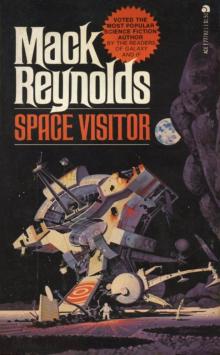 Space Visitor
Space Visitor A Kiss Before Loving
A Kiss Before Loving Episode on the Riviera
Episode on the Riviera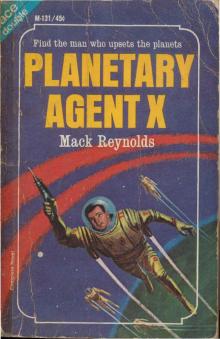 Planetary Agent X
Planetary Agent X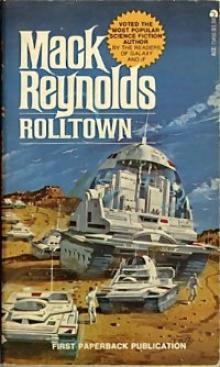 Rolltown bh-3
Rolltown bh-3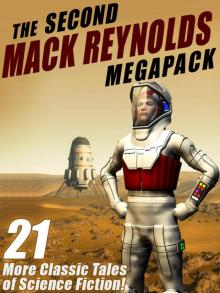 The Second Mack Reynolds Megapack
The Second Mack Reynolds Megapack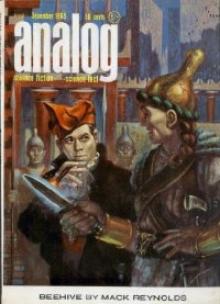 Dawnman Planet up-2
Dawnman Planet up-2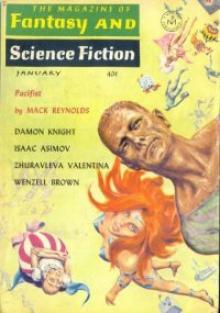 Pacifist
Pacifist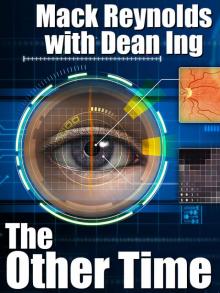 The Other Time
The Other Time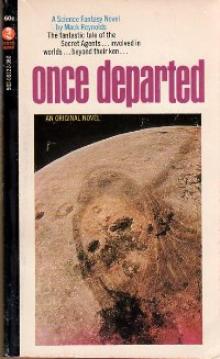 Once Departed
Once Departed IQ
IQ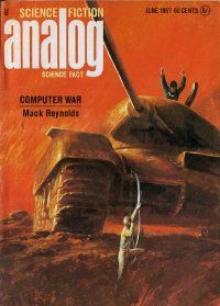 Computer War
Computer War Earth Unaware
Earth Unaware The Rival Rigelians up-3
The Rival Rigelians up-3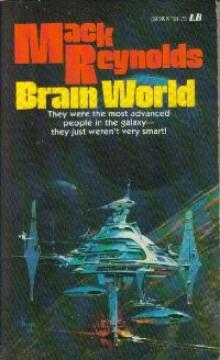 Brain World up-7
Brain World up-7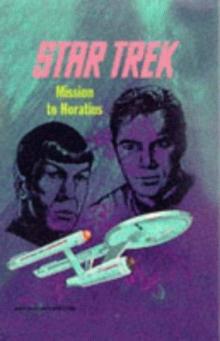 Star Trek - TOS - Mission to Horatius
Star Trek - TOS - Mission to Horatius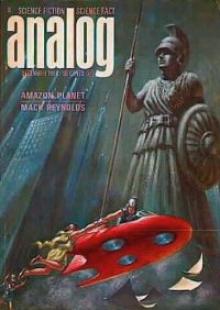 Amazon Planet up-5
Amazon Planet up-5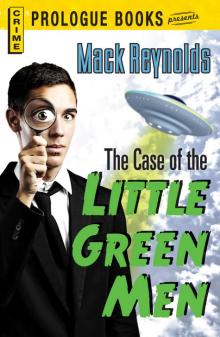 The Case of the Little Green Men
The Case of the Little Green Men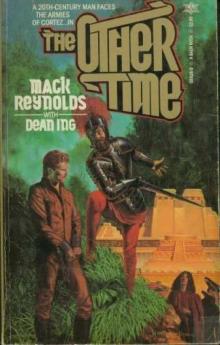 Other Time
Other Time The Mack Reynolds Megapack
The Mack Reynolds Megapack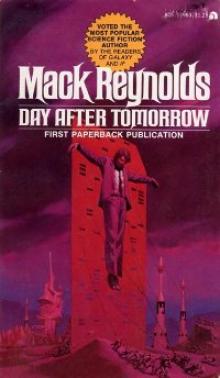 Day After Tomorrow
Day After Tomorrow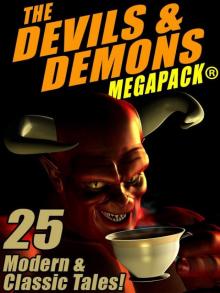 The Devils & Demons MEGAPACK ®: 25 Modern and Classic Tales
The Devils & Demons MEGAPACK ®: 25 Modern and Classic Tales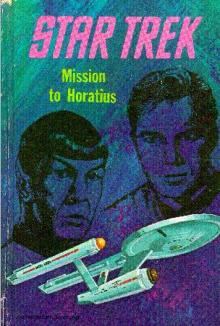 Mission to Horatius
Mission to Horatius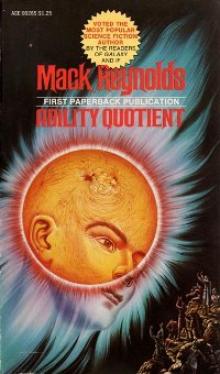 Ability Quotient
Ability Quotient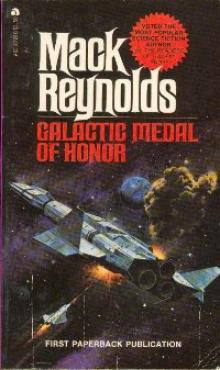 Galactic Medal of Honor
Galactic Medal of Honor Trojan Orbit
Trojan Orbit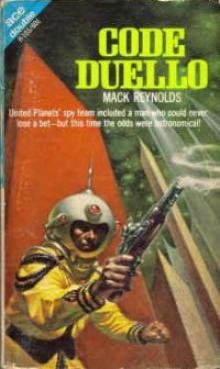 Code Duello up-4
Code Duello up-4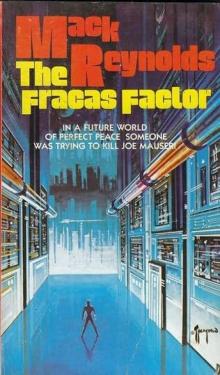 The Fracas Factor
The Fracas Factor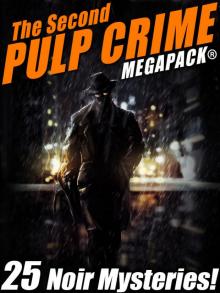 The Second Pulp Crime
The Second Pulp Crime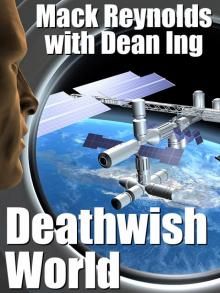 Deathwish World
Deathwish World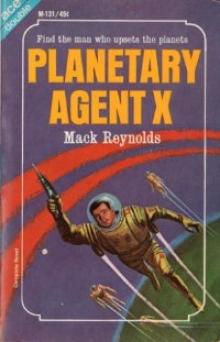 Planetary Agent X up-1
Planetary Agent X up-1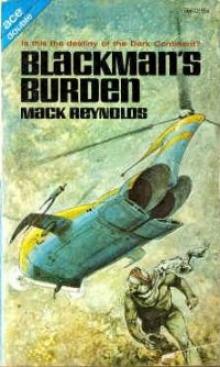 Blackman' Burden na-1
Blackman' Burden na-1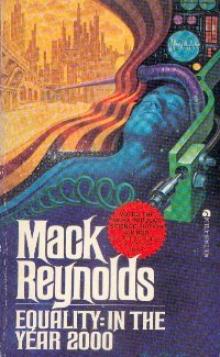 Equality: In the Year 2000 jw-2
Equality: In the Year 2000 jw-2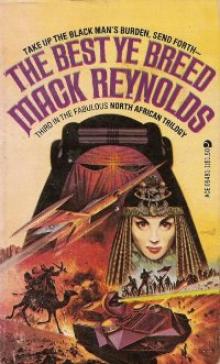 The Best Ye Breed na-3
The Best Ye Breed na-3 The Jet Set
The Jet Set The Rival Rigelians
The Rival Rigelians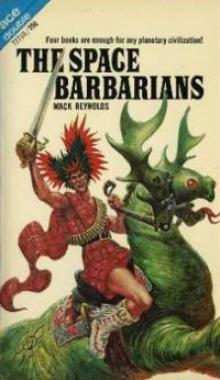 The Space Barbarians
The Space Barbarians